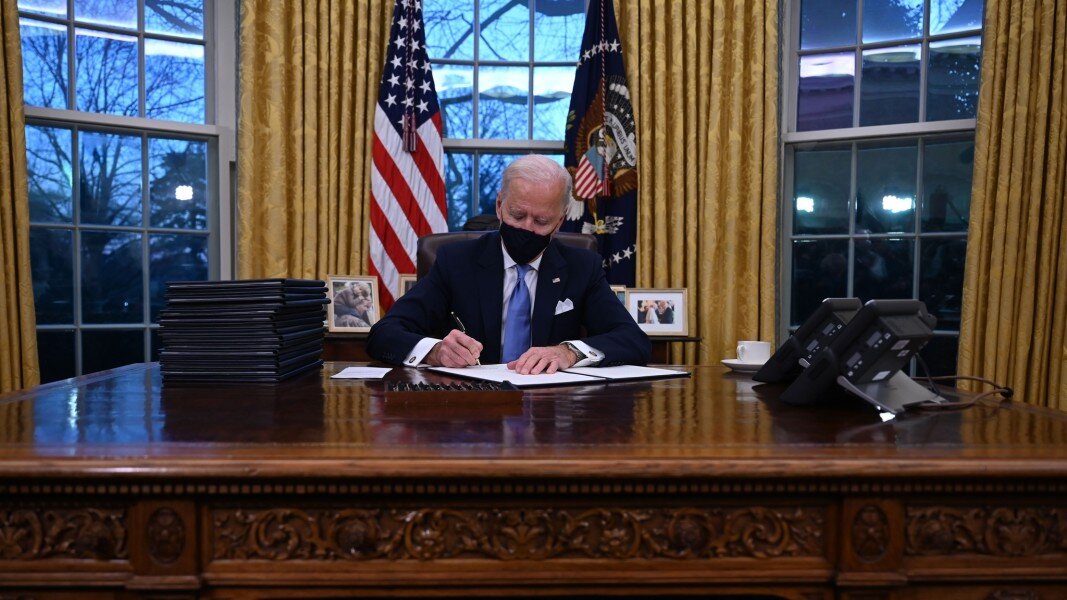An Early Look at Biden's Foreign Policy
President Joe Biden in the Oval Office on the first day of his term. Source.
Given the starkly contrasting governing styles between Donald Trump and Joe Biden, it should not come as a surprise that American foreign policy is being reworked under the new administration. After relations with allies such as France and Germany were stained under the Trump Administration, several nations’ leaders now welcome the Biden Administration with open arms and have begun talks immediately.
France and Germany are amongst the countries eager for the new administration. Whereas Trump and French President Emmanual Macron had a tense relationship marred by uncomfortable handshakes, differences in approach to climate change, insults, and more, Biden seeks to begin his Administration with a mended France-U.S. relationship. After Biden’s win, Macron congratulated him and expressed his desire to work together on current issues such as climate and terrorism. This past Sunday, Biden spoke to Macron and expressed his desire to strengthen bilateral ties. Further, Biden emphasized his commitment to bolstering transatlantic relations and tackling challenges such as climate change and COVID-19 together.
German Chancellor Angela Merkel also congratulated Biden and Harris. In a statement on Twitter, Merkel has said that she will ‘look forward to future cooperation with President Biden.” Merkel’s statement should come as no surprise; her relationship with Trump started off tense and remained so for the duration of Trump’s term. This is largely due to incidents such as the 2018 NATO Summit, where Trump accused Merkel of being reliant on Russia for gas and energy. This past Monday, Biden told Merkel that he is looking forward to revitalizing the transatlantic alliance with Germany.
Biden ensured to call America’s neighbours as well. A call between Biden and Canadian Prime Minister Justin Trudeau resulted in an agreement to join forces to combat COVID-19 in North America, among other issues. However, this new relationship began with an early disagreement as Biden scrapped the proposed Keystone XL oil pipeline from Canada to the U.S. in his first day in office. Trudeau expressed his disappointment regarding the decision to rescind the permit for the pipeline. Biden has acknowledged Trudeau’s disappointment, yet has reaffirmed his desire for an active dialogue and deeper cooperation with Canada.
Mexican President,Andrés Manuel López Obrador, has been similarly welcoming to the new Administration in D.C. Unlike previously mentioned leaders, Obrador was among the last world leaders to congratulate Biden on his victory. Further, Obrador has praised Trump previously, citing that he had a “very good relationship” with Trump. A call between Biden and Obrador this past Friday did not include the most controversial issues complicating the two countries’ relationship, such as the presence of American drug law enforcement in Mexico, on its agenda. According to sources briefed on the call’s contents, this is a sign that Biden seeks to reset his relationship with Obrador.
Russia and China have not been quite as welcoming. This past Tuesday, Biden had his first call with Russia. In this call, Biden confronted President Putin on several issues such as cyber attacks and the poisoning and arrest of Alexey Navalny, an anti-corruption activist and enemy of Putin. Biden has accused Trump of being too weak on Russia. Considering Trump’s message of congratulations to Putin after Putin’s victory in 2018 - a highly-criticized one - Biden may have reason for this accusation. As illustrated by this first call, Biden hopes to take a firmer stance with the adversary.
Chinese President Xi Jinping was also among the last leaders to congratulate Biden, doing so three weeks after his victory. Xi’s callousness may come as a result of Biden’s plan to weaken China on the international stage. Biden intends to build a grand alliance against China. Biden plans to hold a “Summit for Democracy” in order “to renew the spirit and shared purpose of the nations of the Free World.” Part of this summit is to establish a clear alternative to the autocratic rule helmed in Beijing. In response,Xi issued an implicit warning against the Biden administration.
Regardless of the President, America’s alliances and rivalries are typically maintained between administrations. However, the quality and intensity of relationships changes. The transfer of power from Trump and Biden has seemed to bring our allies closer to friendship and our rivals further.

